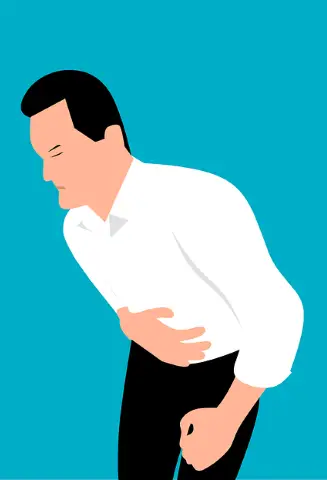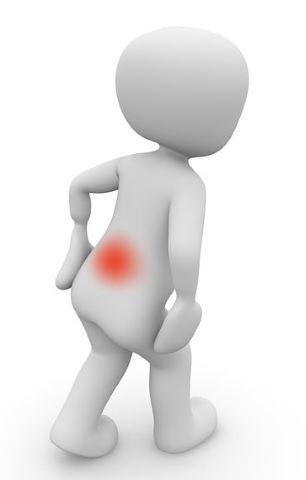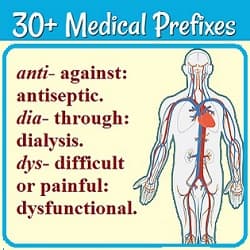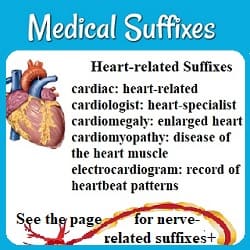Medical Words for Common Symptoms
Health care professionals need to know a large number of medical words in English. If you're a professional from another country working in the English-speaking world, you also need to know the common words patients use for their symptoms and conditions.
It’s easiest to learn these words (or any vocabulary) in context. (That means seeing or hearing a word in its normal surroundings.)
That’s why EnglishHints has organized medical words by themes. Medical Vocabulary discusses the common names for different types of
> health care practitioners,
> body systems and
> associated illnesses, tests, and treatments.
This page gives examples of the professional medical term (in italics) and/or the lay (non-professional) term for some common medical conditions, signs, and symptoms.
Common Symptoms & Possible Causes
Symptoms are the problems a patient has noticed—the usual reason they go to a doctor.
They can be irritants like headaches or an upset stomach. They can also include life-threatening emergencies like massive bleeding (hemorrhage.) Besides relieving the symptoms, the doctor will try to find and treat the problem causing them.
This page does not discuss how to make a diagnosis (determine the definite cause of the patient’s problem). That's way beyond my expertise (!) The examples below just suggest possible causes of symptoms. The purpose is to help you connect them and make these medical words easier to remember.
Respiratory & Head Problems
Sneezing or nasal discharge (a "runny nose”) may be caused by a viral infection like a cold or the flu or by seasonal allergies ("hay fever").
Viruses and allergies can also cause nasal or sinus congestion (a “stuffy nose”) and headaches.
Viruses like the flu can cause coughing and/or a "sore throat" (as well as overall discomfort, aches, and exhaustion.)
Smoking, allergies, or asthma can also cause throat irritation and coughing.
Difficulty breathing (dyspnea), may be caused by asthma, lung or heart disease, or even running hard. We talk about being 'short of breath.'
A headache may be caused by a virus (as well as by tension and other things.) Earache and toothache are usually caused by a bacterial infection.
Stomach & Intestinal Problems

Stomach or abdominal distress (a 'stomachache') can have several causes, including
- Viruses (the "stomach flu"-- different than "the flu," which is caused by a respiratory virus with multiple symptoms)
- bacteria ("food poisoning")
- overeating,
- food intolerance,
- and several diseases of the stomach or colon, from ulcers to inflammation or cancer.
Severe cases often involve symptoms like
- vomiting (emesis, or “throwing up”),
- abdominal cramping,
- and diarrhea ("the runs" or very loose 'stools').
Constipation is very hard or painful 'bowel movements' (expulsion of feces.) It can be caused by too little water or fiber intake, inactivity, worry, and some medications.
Skin Problems
A rash is a red, often raised, bumpy, or irregular area on the skin. Rashes often 'itch', so that a patient wants to rub or scratch them, even though that often irritates the skin more.) Rashes may be caused by dermatitis, eczema, a skin infection, psoriasis, or a chemical or allergic reaction.
Itchy skin (pruritus) can also be caused by extreme dryness, an insect bite, or contact with poison ivy or poison oak.
Other Symptoms
A viral or bacterial infection (as well as malaria) may cause alternating chills and fever. (A chill is feeling very cold and shivering. A person with a fever has a high temperature and may sweat.)
The flu can also cause aching muscles and overall weakness and discomfort.
Urinary problems have several possible causes. They include cystitis, diabetes, kidney stones, and age-related conditions including prostate conditions in men and incontinence (a "leaky bladder.")
Dysuria (painful or difficult urination) may also be caused by insufficient fluid intake. Excessive fluid intake is another possible cause of polyuria (excessive urination).
Swelling (edema) of the knees, legs and ankles, hands, or other joints or tissues, may be caused by
- an injury to the area,
- poor circulation,
- hypertension,
- or excessive salt intake resulting in fluid retention.

Backaches also have many causes. These include
- poor posture or incorrect lifting of heavy objects,
- an accident or injury,
- nerve compression or injury,
- vertebral degeneration,
- or muscle tension.
Other common muscle, ligament, or tendon injuries include
- sprains,
- strains,
- twisted ankles,
- dislocated shoulders,
- and knee injuries.
They are commonly caused by a fall or some other accident. Accidents may also result in fractures (broken bones.) Overweight and obese patients may be especially at risk for injuries to weight-bearing joints.
A Note about Slang & ‘Bad’ Language
It's important to understand words that many people use for body functions. Just don't use the most offensive words!
Slang is language that people may use casually instead of the ‘proper’ word. (An example above would be “the runs.”)
Sometimes people also use euphemisms. These are substitute words for terms that are considered embarrassing or improper. (They're common when people don’t know the correct medical terms, especially for excretion or sexual organs.)
For example, many laypeople (non-professionals) speak of a woman’s menstruation as her ‘period.’
The tension beforehand is PMS (premenstrual syndrome.) Some are embarrassed to talk directly about menstruation, especially in “mixed company” (the presence of both men and women). Teens may be especially embarrassed to discuss it.
Many of these terms are different in different countries or age groups, as well as among people with different levels of education. For example, in England people sit on their “bums”, in California “bottoms”; if someone wants to be formal “buttocks.” (These aren't quite 'polite' words, but there are other terms that are even less proper.)
For urine or urination, children (and sometimes adults) will use ‘pee’ or ‘pee pee’ or ‘going #1.’
For defecation or feces, they may say ‘poo,’ ‘#2,’ ‘stool,’ going potty, or going to the bathroom. (‘Bathroom,’ ‘restroom,’ or ‘john' are the American terms for the British ‘W.C.’)
You will also hear ‘crap’ and ‘sh--.’ (The second is not even acceptable to write-- but rhymes with ‘it.’) Both are also used as ‘swear words.’ (That's bad’ language when a person is angry or wants to shock.) Some people use them as exclamations.
They are very unprofessional and NOT acceptable in most professional settings.
‘Bullshit’ is literally ‘steer manure.’ It's used as a strong expression of disagreement. It is not quite as unprofessional, though it’s still crude. When it is abbreviated to ‘B.S.’ it’s more-or-less acceptable, at least in many parts of the U.S. (I'd still recommend not using it in professional settings.)
Related Pages
Learn the meanings and Greek roots of Medical Prefixes and practice them with a quiz.
Learn the English meanings of Medical Suffixes with Greek roots, then take a quiz to check your understanding.
Review basic medical vocabulary: titles for health professionals, abbreviations, diseases, tests, & treatments.
Home> Medical English> Medical Words
Didn't find what you
needed? Explain what you want in the search box below.
(For example, cognates, past tense practice, or 'get along with.') Click to see the related pages on EnglishHints.
| site search by freefind | advanced |









